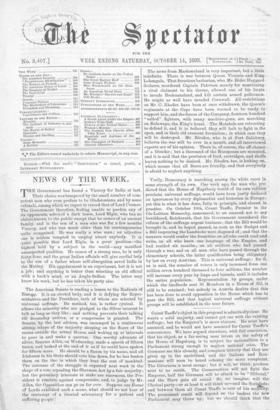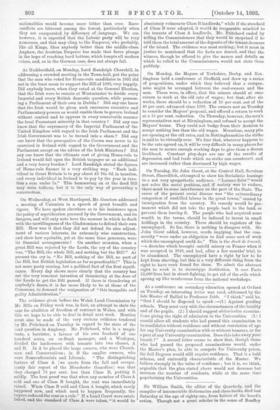Count Taaffe's object in this proposal is admittedly clear. He
wants a solid majority, and cannot get one with the existing suffrage; but the Emperor's is more obscure. He must have assented, and he would not have assented for Count Tauffe's convenience. We have argued elsewhere, with full conviction, that his object. as a far-seeing man intent on the safety of the House of Hapsburg, is to subject the nationalities to a Parliament strong enough to neglect national cries. The Germans see this already, and complain bitterly that they are given np to the uncivilised, and the Italians and Rou- manians will soon be heard echoing the same complaint. The bitterness is most savage ; but it will, we think, produce next to no result. The Conservatives will not fight the Emperor, half the Germans will be afraid to be " illiberal," and the Slays gain all round. So, we imagine, will the Clerical party—or at least it will think so—and the Sceig&ts ; and between them all Count Taaffe is sure of his ma ority. The permanent result will depend on the leaders the new Parliament may throw up ; but we should think that the nationalities would become more bitter than ever. Race- conflicts are bitterest among the lowest, particularly when they are exasperated by difference of language. We see, however, it is expected that the Labour party will be very numerous, and that may cling to the Emperor, who probably, like all Kings, likes anybody better than the middle-class. Anyhow, the Austrian Emperor has made that fierce plunge in the hope of reaching hard bottom, which tempts all modern rulers, and, as in the German ease, does not always fail.



















































 Previous page
Previous page